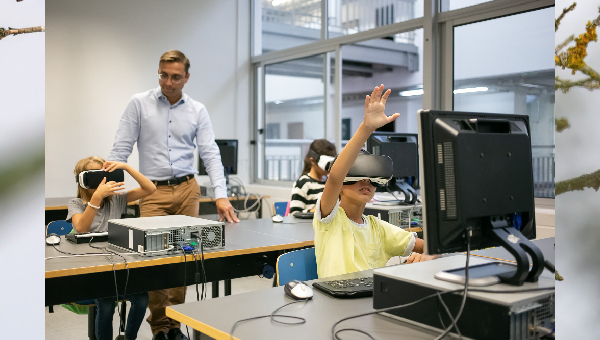How AI is Redefining Personalized Learning in Modern Classrooms

Technological development has been apparent in several facets of existence and learning is no exception in the current years. Education, with the introduction of AI in the present-day classroom, is changing the approach towards enhancing student success geared towards providing individualized educational services the student deserves. This transition is effective not only in increasing the participation of the students but also in improving the result of the learning process through inventiveness, flexibility, and efficiency of education delivery.
Personalization of learning
Adaptive learning is not something that can be regarded as a recent invention. In the past, this referred to practitioners adapting content to be taught or tasks accomplished and strategies for use according to student characteristics: learning profiles, personal preferences, etc. However, they described the above approach as often time-bound with challenges of addressing a large class needs’ diversity. The utilization of AI approaches student individuality more flexibly and extensively thus making it possible to deliver intended and desired learning effectively on a wider scale.
AI-Driven Adaptive Learning Systems
Adaptive learning is one of the biggest areas already championed by AI in the world of personalized learning. These are real-time analytical platforms that help to capture and analyze students’ performance and learning behaviors. Depending on the learned material, the presentation, speed and level of difficulty of the lessons are then modified to fit the student's needs.
For instance, in the learning material where a student is stuck for some concept, the AI system can recommend the student to go through a video, an exercise, or an explanation that the student finds more comfortable to comprehend. On the other hand, if a student performs well in a given area, then the system can present other challenging activities to be done. Such a degree of flexibility prevents students from getting either bored or overburdened with information they have to memorize; therefore students can proceed at their own pace.
AI-Enhanced Feedback and Assessment
Feedback is a very important aspect in almost all learning activities and due to the advancement in technology, AI is now a game changer in the giving of feedback. Paper and pencil questioning such as tests and quizzes do not afford a teacher much information on the learning progress of the student. However, the AI can present feedback that is more extensive and prompt, compared to the human assessment, which focuses on the weak points of the work of a learner.
With the help of AI tools, it is possible not only to check the correct results of a student but also the way how he or she solves problems, the possible critical thinking and even interest in the studies. This kind of feedback enables educators to identify the students who require intervention and close attention to offer them extra lessons before they get left behind. Furthermore, AI will facilitate several shifts in the theory and practice of pedagogy and andragogy on behalf of teachers since it will take a great deal of time to analyze students' abilities through conducting tests.
Personalized Learning Paths
The final benefit that AI offers to personalized learning is the creation of paths for learning for students. Similar to how it can learn a vast amount of data, including a student’s past performance, learning style and even their interests, it can map a curriculum that meets the student’s best learning experience. It also offers an opportunity to pay special attention to the areas of difficulty and at the same time engage in the subjects of personal interest and, therefore, achieve more meaningful learning.
For instance, a learner who prefers lessons that deal with science but have poor mathematics results can have a curriculum section that deals with scientific issues, while mathematical lessons can be incorporated into a form that will overcome the learner’s resistance. This helps the student overcome a challenge while at the same time not only helping them to want more and strive to learn more.
AI in Special Education
AI for personalized learning Student differentiated learning utilizing AI is most transformative to inclusive education. Students with disabilities or learning difficulties need to get extra instruction and tutoring, and this does not go well with a conventional teaching environment. Artificial intelligence can be used to close this gap in the same manner in which it proposes to enhance instruction to suit a specific type of student.
For instance, for students with learning disabilities, it can be of help to enable multiple teaching approaches and technologies that comprise images and audio technologies. It can also assist educators in tracking the progress of special education students better to make sure that those who need assistance are available. However, one cannot overlook the impact of technology, and particularly of AI, to detect learning disorders as soon as possible to ensure corrective measures that can dramatically impact students’ outcomes.
Teacher Professional Learning
It has gone further to show that with the use of AI, students’ learning is being enhanced as well as the growth of the teaching profession. The use of AI can be beneficial for educators as well, as it can help them get insights into their teaching performance and suggest ways they can develop. For instance, AI can capture various interactions in the classrooms and how teachers interrelate with the students, manage the class and or disseminate the content.
In addition to that, AI can be used to recommend training programs, workshops or other resources for teachers according to their requirements and objectives. Such an approach to the continuous professional learning of teachers is much more effective because, in this way, educators are prepared to work with children with individual learning styles and needs as well as to adapt to changes in the educational process and the introduction of innovative technologies.
Challenges and Considerations
As seen earlier, the use of AI in personalized learning has many advantages, but on the same note, some issues arise that need to be addressed. The use of AI systems is very dependent on large amounts of data of student activity and there are questions about how this data is gathered, managed, and processed. The protection of student data as well as ensuring that the systems being used have met privacy protocols assures trust and students’ protection.
One of the concerns is that it can only aggravate existing prejudices or even bring new ones. Algorithms are only as unbiased as the sources with which they learn and if the feeds are skewed, the AI system becomes a piece of prejudice in its results. AI should be effective meaning it should be transparent, and free from bias to make way for a fair system and enable every learner to get the right kind of support.
The Role of AI in the Future of Personalized Learning
The importance of AI in the personalization of learning is therefore believed to increase with time, especially with the current advancement in technology. For instance, a learner who prefers lessons that deal with science but have poor mathematics results can have a curriculum section that deals with scientific issues, while mathematical lessons can be incorporated in a form that will overcome the learner’s resistance.
However, as this innovation is integrated into the education systems, it is believed that it will bring about change in the modalities of teaching, subjects, courses of study and even the principles of teaching testing and assessment that are practiced in today’s society.
Conclusion
There is no doubt that AI is revolutionizing the concept of personalization of learning in contemporary learning spaces, for good learning opportunities and better learning outcomes. This means that, through the use of adaptive learning tools, and individual feedback, learning paths, and support for special needs learning, AI is enhancing education. Nonetheless, it is crucial to discuss the issues that AI poses, including the invasion of privacy and discrimination, so that no student will be left behind in the global use of such developments. In the future, cooperation between teachers and AI will play an important role in the development of learning processes and the achievement of unique learning for each learner.








